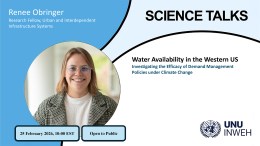On 19 June 2025, UNU, Habitat for Humanity and UN-Habitat will co-organize "Addressing Loss and Damage in Informal Settlements: Pathways to Resilience and Equity", a side event of the June Climate Meetings (SB62) — the 62nd Sessions of the UNFCCC Subsidiary Bodies. This hybrid side event (online and in-person) will begin at 15:00 (CEST) on Zoom and in the Plenary Building, Rhine level (1F), Room Bonn, World Conference Center Bonn.
The institutional landscape for Loss and Damage under UNFCCC is evolving rapidly. In the ongoing discussions on the operationalization of the Santiago Network and the Fund for responding to Loss and Damage, the vulnerability of several marginalized groups is discussed through perspectives that include human rights, gender, indigenous peoples and migrants. These issues are pushed by civil society and the UNFCCC constituencies representing these groups. Yet, people living in informal settlements and the losses and damage they face are not widely represented.
Informal settlements and their inhabitants, however, face growing climate change-related loss and damage. Awaiting urgent finance, downscaled data and stronger international policy, communities are already demonstrating innovation through localized action. Bringing their experiences into this policy debate requires an understanding of how they experience losses and damages, what actions are already taken and how their needs can be adequately addressed on local, urban, national and international scales.
Objectives
- Showcase local level Loss and Damage action: Highlight grassroots efforts and broader response needs on the local level to identify needs and existing capacities to build on when designing Loss and Damage instruments
- Achieve shared understanding of needs and constraints: Identify key opportunities and limitations at different geographic and administrative scales to derive action points for a better inclusion of informality in Loss and Damage
- Build momentum: Anchor informality and particularly informal settlements as key concerns in Loss and Damage action, and ensure visibility for dwellers of informal settlements in shaping related assessments, mechanisms and funding schemes.
Registration
The on-site side event is open to everyone attending the June Climate Meetings (SB62). To attend the virtual sessions via Zoom, advance registration is required; please click the REGISTER button above.
Programme
Welcome and introduction (hybrid)
- Simone Sandholz, Head of Urban Futures and Sustainability Transformation Programme, UNU-EHS
- Puja Sawhney, Director, Climate Change, Habitat for Humanity (virtual)
Discussion, round 1 (in-person)
Grassroots and urban level
Facilitator:
- Simone Sandholz, UNU-EHS
Speakers:
- Dulari Parmar, Lead — Climate Justice, Youth for Unity and Voluntary Action (YUVA), India
- Urszula Kasperek, Head, CHAMP National Engagement, C40 x GCoM Joint Program
- Mediatrich Triani (Ani) Novianingsih, Indonesia Country Program Manager, Build Change
- Puja Sawhney, Habitat for Humanity (virtual)
Discussion, round 2 (in-person)
(Sub-) national government and regional government fora
Facilitator:
- Cerin Kizhakkethottam, Special Advisor to the Deputy Executive Director, UN-Habitat
Speakers:
- Ayan Harare, Climate Finance Coordinator, Somalia Ministry of Environment and Climate Change
- Hon. Mayor Pablo Yves L. Dumlao II, Mayor of Surigao City, Philippines
- Noralene Uy, Assistant Secretary for Policy, Planning and Foreign-Assisted and Special Projects, Department of Environment and Natural Resources, Government of the Philippines
- Gabriel Mara, Climate Change Officer, Fiji Government
- Karlos Lee Moresi, Programme Adviser and Team Leader, Climate Finance and Resilience, Pacific Islands Forum
Discussion, round 3 (in-person)
Summary statements: Identification of support pathways
Facilitator:
- Christon Herbert, Consultant for Multi-Actor Partnerships for Climate and Disaster Risk Finance and Insurance, Munich Climate Insurance Initiative (MCII)
Speakers:
- Animesh Kumar, Head, UNDRR Office in Bonn, UNDRR
- Cerin Kizhakkethottam, UN-Habitat
- Shen Xiaomeng, UNU Vice-Rector in Europe & Director of UNU-EHS
Event summary and closing (hybrid)
- Simone Sandholz, UNU-EHS





